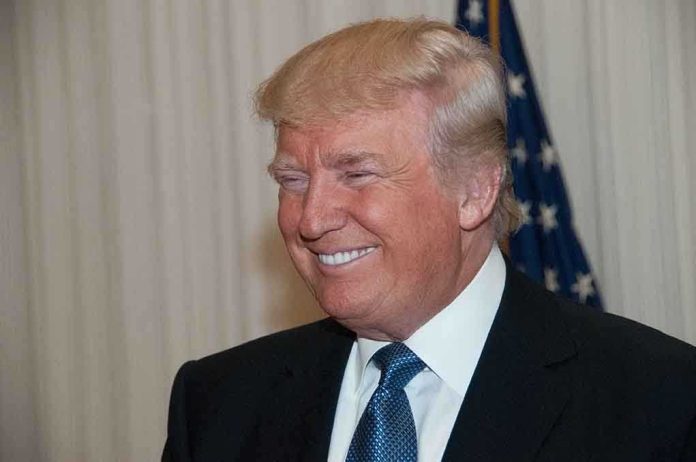
Bipartisan lawmakers now demand total transparency in the Jeffrey Epstein probe, but Barr’s testimony exposes just how deep government secrecy and elite protection run in Washington.
Story Highlights
- Former Attorney General Bill Barr testified before the House Oversight Committee about the Epstein case, denying knowledge of any evidence implicating President Trump.
- The renewed congressional investigation signals bipartisan concern over federal handling, cover-ups, and transparency failures in high-profile criminal cases.
- Subpoenas have been issued to other powerful figures, including the Clintons and former FBI directors, aiming to hold elites accountable.
- Barr’s testimony intensifies scrutiny of the justice system’s reliability and the government’s protection of privileged insiders.
Barr Faces Congressional Grilling Over Federal Failures in Epstein Case
On August 18, 2025, former Attorney General William Barr appeared for a closed-door deposition before the House Oversight Committee, answering tough questions about the federal government’s handling of notorious sex trafficker Jeffrey Epstein. Barr, who led the Department of Justice when Epstein died in federal custody in 2019, faced bipartisan lawmakers determined to uncover whether any evidence of foul play or cover-up was hidden from public view. Barr categorically denied ever seeing information that would implicate President Trump in Epstein’s crimes or any knowledge of a so-called “client list.” This moment highlights the ongoing battle to restore public trust after years of perceived government opacity and elite favoritism.
Elite Accountability Under the Spotlight: Subpoenas Target the Powerful
The latest phase of Congress’s Epstein inquiry signals a seismic shift in Washington’s willingness to challenge privileged insiders. The House Oversight Committee, led by Republican Chair James Comer, has subpoenaed not only Barr, but also Bill and Hillary Clinton, several former FBI directors, and other former attorneys general. This broad sweep reflects growing frustration among Americans who have watched leftist politicians and bureaucrats dodge responsibility for years. For conservative Americans, particularly Trump supporters, holding all players to account—regardless of party—is vital to restoring confidence in the rule of law and curbing the culture of government overreach. Barr’s testimony, praised by Comer for its transparency, sets a precedent for future witnesses as the investigation expands.
Public Distrust Fuels Push for Transparency and Reform
Epstein’s 2019 death in federal custody ignited widespread skepticism about government oversight, elite protection, and the integrity of the justice system. Prior investigations failed to resolve concerns, fueling conspiracy theories and calls for deeper scrutiny. This renewed congressional probe arrives at a time when many Americans feel the system has repeatedly protected powerful figures while neglecting victims and ordinary citizens. Barr’s deposition did little to quell suspicions about institutional failures, prompting lawmakers to seek further testimony from other high-profile officials. For conservatives, the stakes are clear: restoring constitutional values means exposing corruption, demanding transparency, and ensuring equal justice—no matter how powerful the accused.
Impact: Justice System Credibility and Victims’ Rights at Risk
Short-term, Barr’s testimony and ongoing depositions increase pressure on federal agencies and corrections officials, forcing transparency about Epstein’s prosecution, custody, and the handling of critical evidence. Long-term, the investigation may spur reforms in federal detention oversight and broader calls to clean up the justice system’s handling of high-profile cases. Epstein’s victims, who have long sought answers and accountability, remain central to the debate over institutional reliability and elite accountability. For the broader public—and especially for readers concerned about constitutional protections and government overreach—the probe’s outcome could reshape trust in America’s justice system for years to come.
OMG Democrat’s hearts are breaking all over the U.S. today. Bill Barr testifies he didn't see info that would 'implicate' Trump in Epstein case, Comer says
Source: Fox News https://t.co/t8deWwrDcM— Beast Mode Right (@SFDrillSergeant) August 18, 2025
Expert Perspectives and Ongoing Uncertainties
Legal experts emphasize the rarity of a former attorney general testifying under subpoena about an ongoing Department of Justice matter, underscoring the seriousness of Congress’s investigation. Forensic findings about Epstein’s death remain contested, with some pathologists questioning the official suicide ruling. Political scientists note that the bipartisan nature of this probe is a direct response to widespread public distrust in government institutions. While Barr’s deposition has yielded no credible evidence linking President Trump to Epstein’s crimes, the committee continues its work, aiming to pierce decades-old layers of secrecy and restore transparency in cases involving the powerful. The coming weeks will bring more depositions and document requests, keeping the nation’s attention fixed on a justice system under fire.
Sources:
Former AG William Barr sits for deposition in House Oversight’s Epstein probe
Jeffrey Epstein: William Barr testifies in congressional deposition
Bill Barr testifies in Jeffrey Epstein investigation as Congress seeks transparency
Bill Barr testifies: didn’t see info implicating Trump in Epstein case
House Oversight Committee – Official Press Releases













